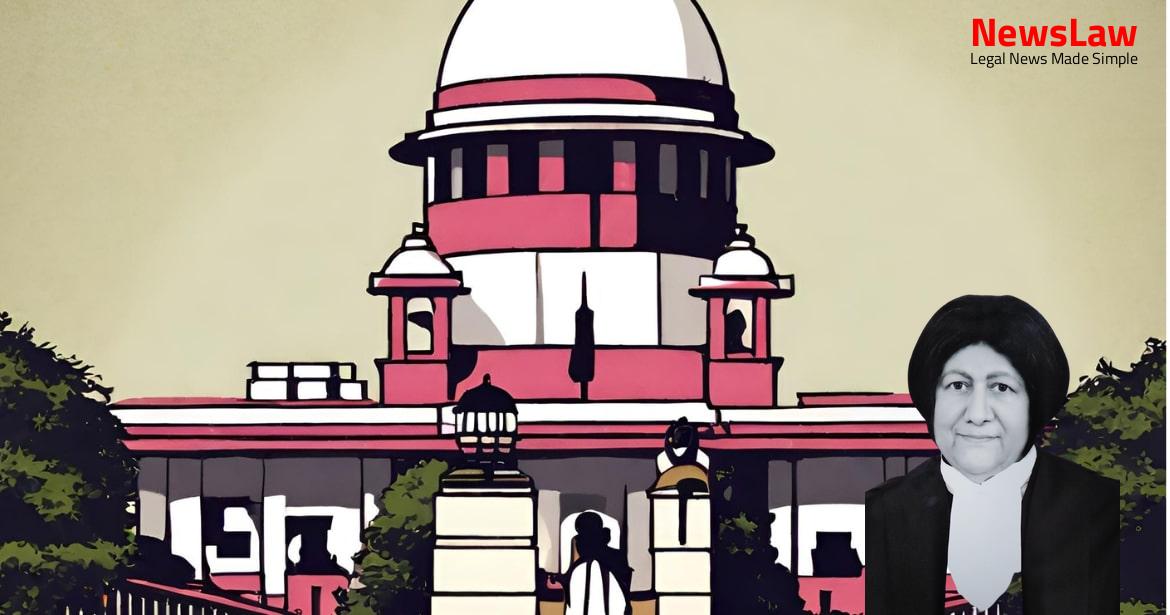In a significant legal judgment by the Supreme Court of India, the priority of employees’ dues in asset sales was examined in a case involving the SARFAESI Act and the Land Revenue Code. The dispute revolved around the distribution of proceeds from the sale of secured assets, with employees seeking precedence for their unpaid dues. The court’s decision sheds light on the conflicting claims and sets a precedent for similar cases in the future.
Facts
- The appellant-bank initiated recovery proceedings against the Karkhana for defaulting on loan repayments, leading to the issuance of a notice under the SARFAESI Act.
- Physical possession of the mortgaged properties of the Karkhana was taken by the appellant-bank as per the SARFAESI Act.
- The Karkhana directed its employees to go on leave without salary due to financial difficulties, leading to legal challenges by the employees.
- The Industrial Court directed the Karkhana to pay unpaid salaries to employees on a priority basis.
- A recovery certificate was sought against the Karkhana, its Managing Director, and the appellant-bank under the MRTU & PULP Act, initially denied but later modified by the High Court.
- The Industrial Court erred in considering the financial condition of the Karkhana as a reason to refuse the recovery certificate.
- The issuance of a recovery certificate of Rs.13,89,84,334 against the Karkhana and its Managing Director was directed by the High Court.
- Employees’ dues were given priority over other dues upon the liquidation of the Karkhana.
- The Collector was authorized to recover the amount from the sale proceeds held in trust by the Appellant-Bank.
- The High Court clarified that recovery could only be made against the Karkhana and not the Appellant-Bank due to the absence of an employer-employee relationship.
Also Read: Judgment Acquitting Accused in Satpal v. State of India
Issue
- The issue in this appeal is whether employees’ dues can take precedence over the claim of the secured creditor in the sale of secured assets under the SARFAESI Act.
- Subsequently, the question arises as to whether employees’ dues can have priority over other claims by being recoverable as arrears of land revenue.
Also Read: Landmark Supreme Court Judgment in Parasvanath Developers Ltd. v. Chandigarh Housing Board
Arguments
- The Appellant argued against the liability towards payment of employees’ dues citing lack of employer-employee relationship.
- The Appellant claimed misapplication of Section 529A of the Companies Act as the company was not in liquidation at the time of asset sale.
- The contention was made that Section 50 of the MRTU & PULP Act and the sale letter from the Appellant-Bank prior to liquidation were wrongly applied for employees’ dues recovery.
- The Appellant invoked Section 167 of the Societies Act and Section 169(2) of the Land Revenue Code to argue against the application of Companies Act to co-operative societies.
- Emphasized on Section 169(1) of the Land Revenue Code making arrears of land revenue a paramount charge over employees’ dues.
- Suggested that as a secured creditor, the Appellant-Bank should be given precedence over proceeds from auction sale as per SARFAESI Act.
- Learned Counsel for the subsequent purchaser of the property relied on a letter stating that liability for employees’ dues must be placed on the Appellant.
Also Read: Defamation Dispute in Cyber Space: Ban Asbestos India v. Network Service Provider
Analysis
- Section 529A of the Companies Act does not apply in this case due to Section 167 of the Societies Act.
- Employees’ dues cannot be treated as a paramount charge under Section 169(1) of the Land Revenue Code.
- Proceeds from the sale under SARFAESI Act are to be distributed towards costs, dues of secured creditors, and then to other claimants.
- In this case, the sale contract between the parties diverges from the order of distribution under Section 13(7) as a ‘contract to the contrary’.
- Appellant’s attempt to restrict liability to provident fund dues post-sale is deemed unsustainable.
- Sale certificate and sale letter form a contract where employees’ dues are to be settled by the Appellant-Bank and other liabilities by the subsequent purchaser.
- High Court’s reliance on Section 529A of the Companies Act was considered erroneous.
- Distribution of sale proceeds should be done as per the sale contract with the purchaser.
- Employees’ dues do not have priority over the claim of the Appellant-Bank under the Land Revenue Code.
- No paramount charge is automatically held by the Appellant-Bank over the sale proceeds.
- Appellant-Bank’s liability stands for settling employees’ dues as per the sale letter’s terms.
- Employees’ dues, due to statutory liabilities, are to be borne by the subsequent purchaser.
- SARFAESI Act distribution rules apply unless a contract stating otherwise is present.
- Money received by the secured creditor must be distributed according to the terms agreed upon in the sale contract.
- Section 13 of the SARFAESI Act allows the secured creditor to take possession of the secured assets of the borrower if the borrower fails to discharge their liability within the specified period.
- All costs, charges, and expenses incurred by the secured creditor in taking action against the borrower can be recovered from the borrower.
- Section 167 of the Societies Act explicitly states that the Companies Act, 1956 does not apply to societies registered under the Societies Act.
- Section 169 of the Land Revenue Code gives precedence to arrears of land revenue over any other debt, demand, or claim in relation to the land or its holder.
- Section 50 of the MRTU & PULP Act allows for the recovery of money due to an employee from an employer through a court order, with the amount being recovered in the same manner as an arrear of land revenue.
- The distinction between sums recoverable as land revenue and sums recoverable as arrears of land revenue was highlighted in various court cases.
- Employees’ dues would fall under the category of claims captured by Section 169(2) of the Land Revenue Code, giving them priority over unsecured claims.
- Expressly created statutory first charges under Central and State laws can take precedence over the claims of secured creditors under the SARFAESI Act.
- The scope of sub-sections (1) and (2) of Section 169 of the Land Revenue Code was discussed in the context of statutory first charges.
- The legislation pertaining to recovery of dues as arrears of land revenue does not automatically create a first charge.
- The real character of provisions regarding recoverable sums under the Land Revenue Code was emphasized.
- The Constitution Bench of the Supreme Court clarified the distinction between sums recoverable as land revenue and sums which create a paramount charge.
- Section 13(7) of the SARFAESI Act establishes that the sale letter and sale certificate form a contract, overriding the order of distribution outlined in the Act.
- The sale letter dated 08.03.2010 and the sale certificate dated 14.09.2010 establish that the Appellant-Bank is obligated to pay employees’ dues from the auctioned property’s sale proceeds.
- The Appellant-Bank does not hold a paramount charge over the sale proceeds.
Decision
- The recovery certificate issued by the Industrial Court on 08.08.2011 must be executed against the Appellant.
- All other dues related to the secured property, including unpaid statutory dues for employees like provident fund, gratuity, and bonus, are to be paid by the Appellant within six months.
- Due to the significant delay in paying salaries to employees, the Collector is instructed to make the recovery within six months from the date of this order.
Case Title: THE MAHARASHTRA STATE CO-OPERATIVE BANK LTD. THROUGH ITS DEPUTY MANAGER AKSHAY NAGARNAIK Vs. BABULAL LADE
Case Number: C.A. No.-000232-000232 / 2016



